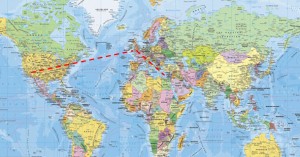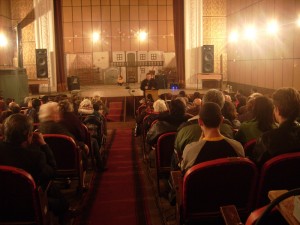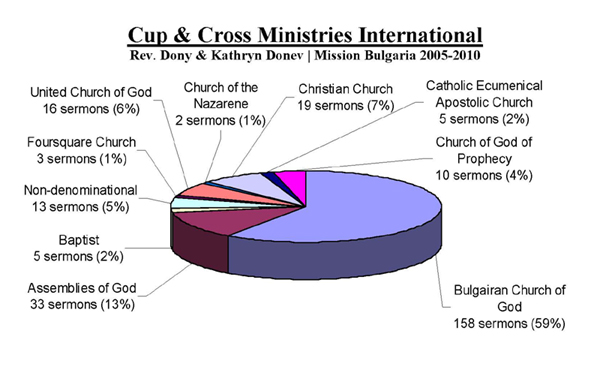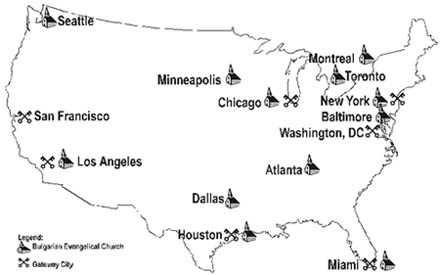Regional Prayer Conference for the Yambol Village Churches
Three New Bulgarian Churches
 In the last year, among other Bulgarian churches we have worked with, we have focused our attention to three newly started Bulgarian congregations located in London, Cypress and Las Vegas. They all have unique stories. The London church emerged from several home groups, which met regularly for years in various suburbs of the vat metropolis. The Vegas church was started not without the prayer and support of the Bulgarian church in Los Angeles. And the Cypress Church of God is a conglomerate of four congregations located on the Greek part of the island, which meets regularly in four of Cypress’ major cities each Sunday.
In the last year, among other Bulgarian churches we have worked with, we have focused our attention to three newly started Bulgarian congregations located in London, Cypress and Las Vegas. They all have unique stories. The London church emerged from several home groups, which met regularly for years in various suburbs of the vat metropolis. The Vegas church was started not without the prayer and support of the Bulgarian church in Los Angeles. And the Cypress Church of God is a conglomerate of four congregations located on the Greek part of the island, which meets regularly in four of Cypress’ major cities each Sunday.
In attempt to improve their ministry and create a context of availability to the people in need, among several other ministerial endeavors, we have helped these churches with their websites. They are now launched and active, easy to be found on the internet in support of their ministry in these three significant global locations. They can be found at:
Cypress Bulgarian Church: http://vitezda.com/
Las Vegas Bulgarian Church: http://lasvegaschurch.tv/
London Bulgarian Church: http://bgchurchlondon.com/
Churches Worked With in Bulgaria
Conference of Bulgarian Churches in America
 The Annual Conference of Bulgarian Churches in North America will be held May 28, 2010 in Huston, TX. More information is available via the website of the Bulgarian Church in Houston at: http://twitterchurch.us/
The Annual Conference of Bulgarian Churches in North America will be held May 28, 2010 in Huston, TX. More information is available via the website of the Bulgarian Church in Houston at: http://twitterchurch.us/
Download the brochure as PDF
Ministering at the Bulgarian Churches of Chicago
With the Annual Conference of Bulgarian Churches in North America being just around the corner, we were invited to minister with the Bulgarian Church of God in Chicago. Last year we were able to hold a weekend training event for their leadership as well as to assist them in the area of web development as a cyber platform for their church. In postmodernity it is ever important that the church has a voice in every field of ministry. Since then they have been able to broadcast their services LIVE which have been viewed by Bulgarian in the States and abroad.
This year we were also able to meet with their web development and pastoral team to offer further suggestions of how to better implement and modernize their church website to more effectively meet their unique needs. Being directed by the Spirit under the leadership of Pastor Vladimir Georgiev, the church has witnessed tremendous success. They are currently in a building project to expand their existing building to accommodate this new growth. It is our prayer that the Lord continues to bless the efforts of the New Life Bulgarian Church of God in Chicago. We were also able to minister at the Bulgarian Baptist Church before we left the Windy City.
HERALDS OF THE TRUTH: A History of the Evangelical Churches in Bulgaria
 From the author of “Imprisoned for Christ”, now the first comprehensive history of Evangelical Christianity in Bulgaria is available in English. With the arrival of the first Congregationalist missionaries in 1844, more Bulgarians heard the Gospel than ever before. Despite resistance from the Bulgarian Orthodox Church, Evangelicals increased both in number and in favor with royal officials after the overthrow of the Ottoman Turkish Empire in 1888. The era of Communism brought new waves of persecution, but the Church in Bulgaria stood strong. This is her story.
From the author of “Imprisoned for Christ”, now the first comprehensive history of Evangelical Christianity in Bulgaria is available in English. With the arrival of the first Congregationalist missionaries in 1844, more Bulgarians heard the Gospel than ever before. Despite resistance from the Bulgarian Orthodox Church, Evangelicals increased both in number and in favor with royal officials after the overthrow of the Ottoman Turkish Empire in 1888. The era of Communism brought new waves of persecution, but the Church in Bulgaria stood strong. This is her story.
Regional Prayer Conference for the Yambol Village Churches
 Some 200 people from over a dozen regional churches gathered in the village of Malomir on Saturday at a regional prayer conference. Several ministers and representatives from the Bourgas, Stara Zagora, Haskovo and Sliven regions attended as well. This is the third of four prayer meetings held each year in the area to encourage the village churches, gather the people together for time of rejuvenation and set quarterly goals for each season of the year.
Some 200 people from over a dozen regional churches gathered in the village of Malomir on Saturday at a regional prayer conference. Several ministers and representatives from the Bourgas, Stara Zagora, Haskovo and Sliven regions attended as well. This is the third of four prayer meetings held each year in the area to encourage the village churches, gather the people together for time of rejuvenation and set quarterly goals for each season of the year.
The churches that gathered were congregations with which our teams have worked and ministered with for some 15 years now. Many of the congregations were started and registered during this term of ministry, while others continued their operation having gone through the trials and tribulation of Communism. Unfortunately, the last 20 years of economical, political and social crises in Bulgaria have left their scar on the both the people and the churches. The villages, once flourishing and prospering, are now left to the elderly as the young generation has moved in search for a better life in the big city or in many cases in a foreign land. Thus, the evangelical churches in the Bulgarian villages remain one of the few strongholds of moral encouragement, family values and life as we know it.
The answer to such a great spiritual need is rooted in deep prayer and personal piety, which is exactly what our teams have been trying to accomplish through these quarterly prayer conferences. As the attendance in years past has gradually grown, the Lord has called these people to the ministry and they have faithfully helped our teams in the progress of the work. Therefore, they were all encouraged to gather once again while we shared the Word in several sessions throughout the day. Our message focused on the subject of personal prayer and its leading role within the life of the local church. The efforts of all were well rewarded by a powerful move of the Spirit during the time of prayer, after which people were encouraged by the announcement of one more regional prayer conference for this year, which will probably take place during the holiday season.
Bulgarian Churches in North America: Contextual Assessment
After awaking in the morning of the 21st century, the world was rapidly introduced to a new postmodern movement called globalization. At a top political and economic level, globalization is the process of denationalization of markets, politics and legal systems purposing the implementation of a global economy. However, globalization is much more than an economic event as it affects social status and human rights of people worldwide. For the world community the process of globalization is a process of internationalization describing cross-border relations between countries, growth in international exchange and interdependence. It is also viewed as a liberalization process of removing government-imposed restrictions on movements between countries in order to create a borderless world. Globalization further implements spreading various objects and experiences to people at all corners of the earth creating universalization. In a cultural context, globalization is often seen as Westernization of the world. Finally, globalization carries the meaning of deterritorialization – reconfiguration of geography reforming any social place in new terms of independent territory, distance and borders.
Since the church is a global event, inevitably this process affects the community of believers. The “global believer” seeks to connect with people of similar nature independent of race, location and social status. Thus, church mission and church ministry reclaim its original Biblical global perspective. In this process, the church of postmodernity is liberated from its nationality and reaches toward internationalization establishing a new multicultural identity with a global perspective and mission. As a result multicultural churches gain a contextual new function serving as identity sources. Such is the case with the network of Bulgarian churches in North America.
Established to unite all Protestant Bulgarian churches in North America, it reaffirms the participation of Bulgarian immigrant communities in the global multicultural ministry. This present contextual assessment will explore the process of establishing a network of Bulgarian churches in Northern America. Read the complete paper (PDF)
Bulgarian Evangelical Churches in America
The annual conference of Bulgarian Evangelical churches in North America was held May 25-28, 2007 at the Christian Life Church in Chicago’s suburb Des Planes where the largest number of Bulgarian immigrants is locating. This year the event was hosted by the Bulgarian Evangelical Church of God “New Life” pastored by Stan Tanev. The conference gathered Bulgarian immigrants from all parts of America. The churches from Minneapolis, Dallas, Huston and Los Angelis participated. Representatives from New York City, Tennessee and Las Vegas reported growth of newly started Bulgarian congregations in their respective areas. Special guest of the conference was Martha Zaplishny Jackson, daughter of the first Pentecostal missionaries to Bulgaria, Rev. Dionesey and Olga Zaplishny.
Gateway Cities for Bulgarian Evangelical Churches
Bulgarian Evangelical Churches are located in cities which have a high concentration of foreign-born immigrants. Such cities are called gateway cities, a large immigrant point-of-entry city to the United States. Immigrants typically enter the United States through one of these cities and settle there. Such cities contain over half of the foreign-born population in the United States. There are Bulgarian Evangelical Churches active in five of the seven gateway cities as follows:
Bulgarian Evangelical Churches in Gateway Cities
| Gateway City | Foreign Born | Percent of Foreign Born | Bulgarian Church |
| 1. New York, NY | 3,657,269 | 18.7% | Yes |
| 2. Los Angeles, CA | 3,944,828 | 27.1% | Yes |
| 3. Houston, TX | 460,380 | 12.3% | Yes |
| 4. Washington, DC | 578,786 | 8.6% | No |
| 5. Miami, FL | 1,072,843 | 33.6% | Yes |
| 6. Chicago, IL | 914,58 | 11.1% | Yes |
| 7. San Francisco, CA | 1,250,693 | 20.0% | No |
Geographical Location of Bulgarian American Churches and Gateway Cities.
Several facts are obvious from the above comparison. It is apparent that Bulgarian immigrants come to North America in ways similar to other immigrant groups, channeled through the listed gateway cities. Large cities which are gateways are more probable to become a settlement for Bulgarian immigrants due to the availability of jobs, lodging and other immigrants from the same ethnic group. The emerging Bulgarian immigrant communities share religious similarities and belongingness which are factors helping to form the communities. As a result of this process of formation of Bulgarian immigrant communities, the Bulgarian Evangelical Churches in North America emerge. It also seems natural to suggest that as this process continues, Bulgarian Evangelical Churches will be formed in the remaining two gateway cities (Washington, D.C. and San Francisco) and other large cities which meet the requirements to become a gateway city (for example, the city Atlanta). If this is true, it should be proposed that the Bulgarian Churches in North America follow a strategy for church planting and growth which targets this type of cities.




















